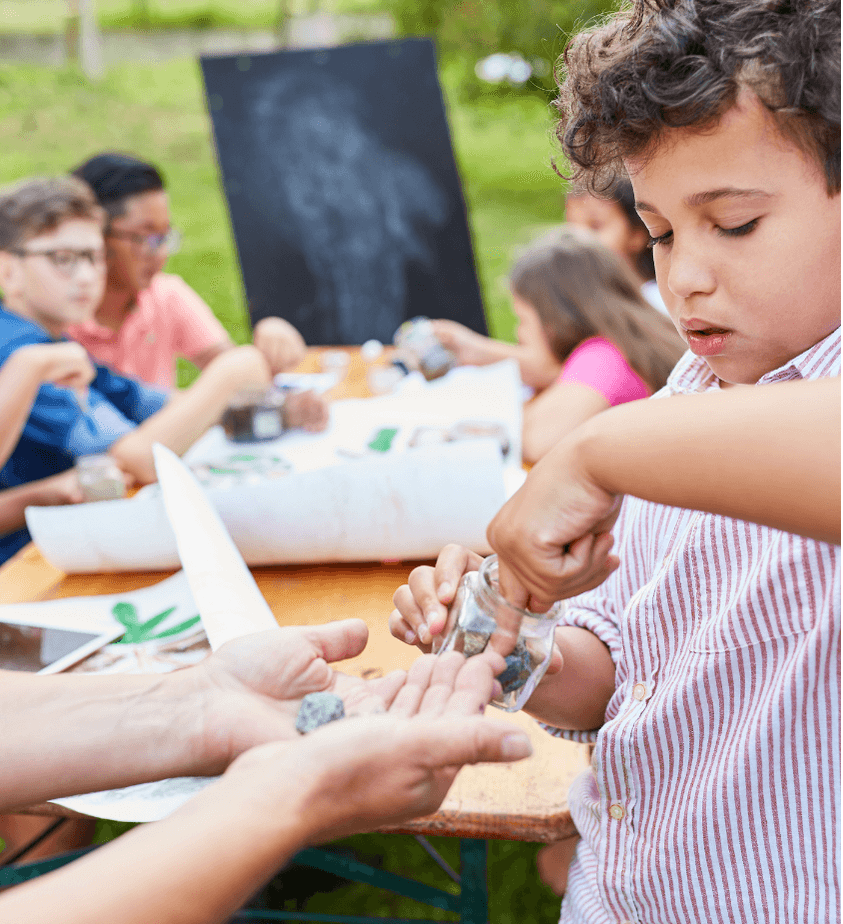Without fun and learning, summer holidays are a thing to forget.
Fun and relaxation is not doing nothing, it's living a lot and it's part of growing up. But during the summer months, children tend to lose 10% of the knowledge they have acquired throughout the year. That's why it's so important to benefit from programmes for cultural enrichment, consolidating learning, and discovering vocations.


Without fun and learning, summer holidays are a thing to forget.
Now that we are no longer students, we know how much two or three months of holidays are worth and how painful it is to see them wasted on procrastination or on bad experiences. In the case of children, where there is still so much to absorb and learn, with so many paths to explore, it is painful for parents to imagine this enormous waste.
Educational institutions have long since been called upon to face up to this challenge, helping to prevent kids from staying at home with nothing but screens, because there are fewer and fewer uncles, cousins and grandparents around.
What is doing nothing?
Schools often deal with young people who don't feel like doing anything, who are disinterested and have a huge inability to decide on an activity.
These behaviors reveal demotivation, if not worse, and should be approached with care and, when necessary, with specialized monitoring. On holiday, this demotivation can slowly begin to set in, caused by a routine lacking in tasks, challenges and human contact. At a time when everyone is comparing themselves with others who are showing off extraordinary lives and unique experiences on social media, demotivation can quickly worsen.
Young people (like adults) follow colleagues or just acquaintances to swimming pools, travelling, parties and having a great time. For those who have a quieter, more isolated start to their holidays, it's possible that they'll start to become demotivated and apathetic, feeling that everything in their lives is uninteresting and monotonous.
The comparison can be difficult, as the social environment is very imposing when it comes to idealising what a good holiday is, what it means to enjoy and live life well. All the more so because it's possible to live unique and unforgettable experiences that aren't very Instagrammable.
That's why just mimicking behaviours and experiences you see on the web can be another way of doing nothing, since at the end of it all you're left with a void that can only be summed up by a few poses and photos, but few memories.
Beaches, sun, games, adventures, reading, playing games, chatting, watching series and films and sleeping are all good things. Fun and relaxation is not doing nothing, it's living a lot and it's part of growing up.
What about learning?
Some studies indicate that during the summer months, children tend to lose 10% of the knowledge they have acquired throughout the year, even more so for children from disadvantaged social backgrounds. The study ‘The Summer Slide’ by Karl Alexander, Doris Entwisle, and Linda Olson, already pointed decades ago to the uneven impact of the summer holidays on learning, with children from more disadvantaged backgrounds falling further behind each new year.
In another study by Downey, von Hippel and Hughes, the conclusion is more curious, but still worrying. They claim that each school year, the differences accumulated during the previous summer tend to be overcome, but the initial inequality remains until the end. The school spends the year correcting only the increase in the gap caused by the holidays, but never has the means to annul the original inequality.
The causes of summer's unequal impact are relatively obvious. Children from more advantaged backgrounds have access to more enriching experiences, such as trips, reading and organised educational activities. That's why the role of multiple educational institutions in promoting cultural enrichment and learning enhancement programmes for families with fewer possibilities is so crucial.
For great programmes, the best programme!
With no assessments or lessons, summer brings discovery, new paths, crossroads and shortcuts that lead to finding vocations and to young people giving themselves more genuinely to what they are really interested in and passionate about.
Summer camps, sports, outdoor activities, reading, artistic discoveries, learning science, social skills and emotional well-being or deepening academic knowledge - there are a multitude of programmes that can be decisive in awakening vocations and discovering interests and passions. But that's not all.
With an attentive team, it's also possible to identify difficulties, barriers of any kind and aspects that have the potential to be valued. And while you're at it, why not record individual and group learning and achievements? The amount of observations and data to be recorded in non-teaching contexts is inexhaustible and can be decisive in individualising and valuing each child and young person.
But how to do it? On paper, in excel tables, in applications spread across different platforms, at the end of the day or week? And what to do with it all? Doesn't what happens in the summer count for the rest of the year?
Fun and learning are worthwhile in themselves, but if you have a tool like e-Scholing, you can make the most of it, give it continuity and have a profound impact on these children's lives.
With e-Schooling, the institution can plan an entire programme in detail, define and plan each activity, associate monitors, staff and trainers, involve families in real time and record all observations with a few simple clicks. In addition, support materials, educational materials or games in any format can be added to each plan and will always be accessible to all participants.
This is a tool that allows monitors, carers and trainers to be focused and free for the activities, being able to make records and follow-ups without having to disconnect from the essential: the relationship with the children.
In e-Schooling, non-teaching activities, holiday programmes and informal learning are valued just like school curricula, with complete tools from planning to assessment, interaction and recording, ensuring individualisation and a close look at each child.
e-Schooling gives you the means and tools to realise a holistic vision of learning. If it's a fundamental platform for your school year, it's also the best programme for the school holidays.
Newsletter
Join our Community!
Discover, first-hand, all the news and information about e-Schooling and receive content about the latest trends and innovations in the area of education!
